|
|
|
Sort Order |
|
|
|
Items / Page
|
|
|
|
|
|
|
| Srl | Item |
| 1 |
ID:
182544
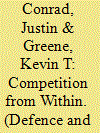

|
|
|
|
|
| Summary/Abstract |
Why do militant groups turn on each other? This behavior is somewhat puzzling, since such groups are often on the same side of a conflict. A growing body of literature seeks to understand political violence by looking at cooperative and competitive relationships among non-state actors. Debates continue about the sources of militant group rivalry. We argue that shared motivations, especially ethnic motivations, along with power differences among groups should help explain inter-group fighting. Our analysis uses new dyadic data on rivalry among the militant groups of Africa and Asia since 1990. Unlike some previous studies, we analyze both terrorist and insurgent organizations. Results suggest that pairs of groups with a shared ethnic identity are more likely than others to have rivalrous relationships. Power asymmetry is also somewhat associated with rivalry, but interaction models indicate that the association is only statistically significant in the presence of shared ethnic motivations.
|
|
|
|
|
|
|
|
|
|
|
|
|
|
|
|
| 2 |
ID:
134982
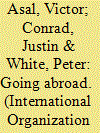

|
|
|
|
|
| Summary/Abstract |
Existing literature on contentious political movements has generally focused on domestic political activity. Using the new Minorities at Risk Organizational Behavior–Middle East data set (MAROB-ME), which contains organization-level data for 104 ethnopolitical organizations in the Middle East and North Africa, we analyze the decision of both violent and nonviolent organizations to engage in political activity transnationally. Among the results, we find that diaspora support is associated with transnational nonviolent protest, whereas foreign state support and domestic repression increase the use of transnational violence. The most robust finding, however, is that participation in the domestic electoral process consistently reduces the likelihood that an organization will engage in any political activity abroad.
|
|
|
|
|
|
|
|
|
|
|
|
|
|
|
|
| 3 |
ID:
154741


|
|
|
|
|
| Summary/Abstract |
What explains the use of military conscription? Using a new data set of more than 100 countries over a period of 200 years, we examine the determinants of a state’s decision to implement a military draft. We argue that the decision to use conscription is largely dependent on historical factors. Specifically, we contend that former British colonies are less likely to use conscription as a means of military recruitment because of an anticonscription precedent set during the English Civil War. We find that former British colonies are far less likely to opt for conscription, even after controlling for counter arguments relating to a state’s colonial legacy. We also examine a number of existing explanations for the use of conscripts, using the data to arbitrate previous debates. We find that democracies are less likely to implement the draft, while states involved in an interstate war or interstate rivalry are more likely to do so.
|
|
|
|
|
|
|
|
|
|
|
|
|
|
|
|
| 4 |
ID:
107921
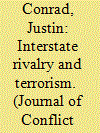

|
|
|
|
|
| Publication |
2011.
|
| Summary/Abstract |
Existing scholarly research on terrorism has largely ignored the role of international relations and its effects on patterns of terrorism. This study argues that strategic interstate relationships can affect the amount of terrorism that a state experiences and should be considered along with "traditional" determinants of terrorism, such as domestic institutional and macroeconomic variables. The study specifically looks at state sponsorship of terrorism, arguing that while we cannot reliably identify state sponsors of terror, we can indirectly observe relevant evidence of state sponsorship. To support this claim, the study examines the annual number of transnational terrorist attacks that occurred in all countries during the period 1975-2003. The results demonstrate that states involved in ongoing rivalries with other states are the victims of more terrorist attacks than states that are not involved in such hostile interstate relationships.
|
|
|
|
|
|
|
|
|
|
|
|
|
|
|
|
| 5 |
ID:
124986
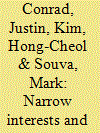

|
|
|
|
|
| Publication |
2013.
|
| Summary/Abstract |
Narrow interests and military resource allocation in autocratic regimes
Why do some autocratic states allocate more resources to the military than others? We contend that as narrow political interests have more influence on a leader, relative to broader political interests, a state's military burden increases. Further, we argue that two domestic factors are central to explaining the relative strength of narrow political interests for military spending, and therefore variation in state military burden. First, institutions that increase the cost of political participation reduce the influence of the median citizen, increasing the strength of narrow political interests and, concomitantly, military spending. Second, as a regime ages, narrow interests become more entrenched and the regime becomes less concerned about overthrow. In turn, older regimes spend more on their militaries. We test hypotheses from this argument by examining the military burden for all autocracies over the period 1950-2000. We find that variation in restrictions on political participation and the age of the regime are central to understanding differences in military spending among autocracies. Further, once these institutional features are taken into account, we find only modest support for the view that certain types of regimes spend more than others. What matters is not regime type but specific institutional features that affect the strength of narrow interests and vary across, and within, autocratic regimes.
|
|
|
|
|
|
|
|
|
|
|
|
|
|
|
|
| 6 |
ID:
183148


|
|
|
|
|
| Summary/Abstract |
What is the relationship between natural resources and rebel governance? Previous studies have argued that resource rich groups have fewer incentives to provide social services. We argue, however, that even well-funded rebels may have incentives to provide some social services to civilians. Specifically, rebel groups profiting from the extraction of natural resources should be more likely to offer health care services as a means of ensuring a dependable civilian workforce than groups who do not profit from natural resources. Using data on both the extraction of natural resources and social service provision by rebel groups, we find strong empirical evidence to support our argument. We conclude with implications for scholars and policymakers.
|
|
|
|
|
|
|
|
|
|
|
|
|
|
|
|
| 7 |
ID:
153954
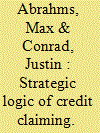

|
|
|
|
|
| Summary/Abstract |
In theory, terrorism is a political communication strategy for groups to convey their grievances and the costs of ignoring them. In practice, though, terrorist groups take responsibility for just a small portion of their attacks. Rather than getting credit for the violence, terrorist leaders generally deny their operatives committed it. This theoretical and empirical disconnect may explain why scholars have ignored the subject of unclaimed attacks despite these being the norm. With a mixed-methods research design, our study helps to fill this lacuna by proposing and testing a new theory to help account for variation in which attacks are claimed.
|
|
|
|
|
|
|
|
|
|
|
|
|
|
|
|
| 8 |
ID:
134520
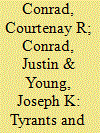

|
|
|
|
|
| Summary/Abstract |
Conventional wisdom suggests that reports of terrorism should be sparse in dictatorships, both because such violence is unlikely to result in policy change and because it is difficult to get reliable information on attacks. Yet, there is variance in the number of terrorist attacks reported in autocracies. Why? We argue that differences in the audience costs produced by dictatorships explain why some nondemocracies experience more terrorism than others. Terrorists are more likely to expect a response in dictatorships that generate high domestic audience costs. Using data from multiple terrorism databases, we find empirical evidence that dictatorships generating higher audience costs—military dictatorships, single-party dictatorships, and dynastic monarchies—experience as much terrorism as democracies, while autocracies generating lower audience costs—personalist dictatorships and non-dynastic monarchies—face fewer attacks than their democratic counterparts
|
|
|
|
|
|
|
|
|
|
|
|
|
|
|
|
| 9 |
ID:
120441
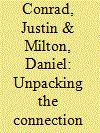

|
|
|
|
|
| Publication |
2013.
|
| Summary/Abstract |
Are countries with large Muslim populations more likely to experience or produce transnational terrorist attacks than countries with fewer Muslims? And if there is a difference, is it attributable to the influence of Islam, or to the economic, social, and political conditions that are common in predominantly Muslim countries? Analyzing all transnational terrorist attacks between 1973 and 2002, this study uses decomposition analysis to identify the relative contributions of the observable and behavioral characteristics of a state on the amount of terrorism that it experiences and produces. The results suggest that Muslim states do not systematically produce more terrorism than non-Muslim states once state repression, human rights abuses, and discrimination against minorities are taken into account.
|
|
|
|
|
|
|
|
|
|
|
|
|
|
|
|
| 10 |
ID:
159565
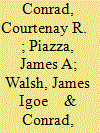

|
|
|
|
|
| Summary/Abstract |
Do governments respond to terrorism with torture? Although governments face incentives to increase torture in response to terrorist attacks, previous research finds no relationship between terror and state torture. We argue that this is unsurprising because incentives to violate human rights differ across domestic government agencies. Using new data that disaggregates state torture by the government agency responsible for the abuse, we investigate the effect of transnational and domestic terrorism on torture perpetrated by military officials. We find that military agents—especially those in democracies—engage in substantively more widespread torture when confronted with terrorism and that this behavior is particularly likely in response to transnational attacks.
|
|
|
|
|
|
|
|
|
|
|
|
|
|
|
|
|
|
|
|
|